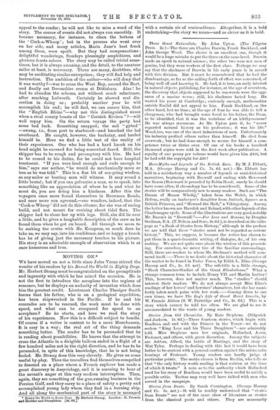Three Great Naturalists. By John Upton. (The Pilgrim Press. 2s.)—The
three are Charles Darwin, Frank Buckland, and John George Wood. The choice is an excellent one, though it would be a huge mistake to put the three on the same level Darwin made an epoch in natural science ; the other two were not men of genius, but they were workers of the first class. Perhaps we may say that the slackness of Darwin in his early years is in accord with this division. But it must be remembered that he had the disadvantage, so far as the calling forth of effort was concerned, of being well off and knowing it. He had, it is true, an early interest in natural objects, publishing, for instance, at the age of seventeen, the discovery that objects supposed to be sea-weeds were the egg- cases of a marine worm; still, his slackness lasted long. He wasted his years at Cambridge ; curiously enough, mathematics outside Euclid did not appeal to him. Frank Buckland, on the other hand, lost no time; at the age of four he was able to tell a clergyman, who bad brought some fossil to his father, the Dean, to be identified, that it was the vertebrae of an ichthyosaurus ! He was always strenuous. As Mr. Upton puts it, ho " never regarded natural history as his profession ; it was his life." Wood, too, was one of the most industrious of men. Unfortunately his industry profited others rather than himself. He died from overwork ; but he had done enough to secure for himself a com- petence twice or thrice over. Of one of his books a hundred thousand copies were sold in the first week after publication. A royalty of one penny per volume would have given him X416, but he had sold the copyright for £30!


































































 Previous page
Previous page